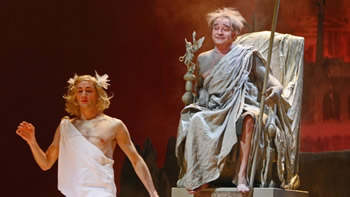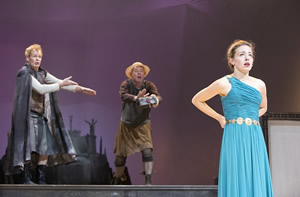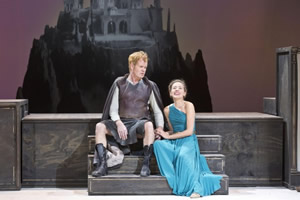
Can Comical Rape Be Holiday Cheer?
By Jonathan Kalb
Amphitryon
By Kleist/Moliere/Plautus
Berliner Ensemble
Bertolt-Brecht-Platz 1
Berlin, Germany
On a recent trip to Berlin, I caught the latest premiere at the Berliner Ensemble: Amphitryon, directed by Katharina Thalbach. Which version of Amphitryon? You might well ask. In 1929, Jean Giraudoux said he knew of thirty-seven, so he decided to call his play Amphitryon 38. In her program, Thalbach credits the author as “Kleist/Moliere/Plautus,” explaining that her script was assembled from pieces of all three of those playwrights’ texts.
I went to see her production because I’d never seen Kleist’s play, which is almost never staged in the United States and has long fascinated me. Plautus, whose drama is the earliest extant, tells a characteristically madcap tale of Olympian lust: Jupiter takes the physical form of the Theban king Amphitryon in order to sleep with his beautiful wife Alkmene, and confusion and silliness ensue when the real Amphitryon returns the next day and must struggle with his own indignation while disentangling the mess. To help out his boss, increase the duplicity, and multiply the shenanigans, Mercury impersonates Amphitryon’s valet Sosias.
Possibly taking a cue from Plautus’s Mercury, who says he could easily make the comedy into a tragedy, Moliere wrote a farce of mistaken identity that maintains Plautus’s lighthearted tone but adds a seriocomic subtext about decorum. In an interesting prologue, Mercury asks the allegorical character Night to aid Jupiter’s seduction plan by lengthening the hours of darkness, and she responds by questioning whether such low behavior is respectable in “the sovereign of the gods.” Many in Moliere’s 17th-century audience assumed he was cheekily referencing the amorous nocturnal adventures of Louis XIV.
Kleist subtitled his drama “a comedy after Moliere” and zeroed in on that seriocomic subtext. Most of his play is a line-for-line translation of Moliere, but he added two original scenes that play havoc with the prevailing comic tone (as does his transformation of Moliere’s tidily formal Alexandrines into jagged and restless German blank verse). The new scenes are: a post-coital encounter between Alkmene and the disguised Jupiter (cum Amphitryon) in which he torments her with hypothetical, sexually suggestive questions about the depth of her religious devotion to him; and a finale where she, after sampling the god’s sexual prowess, is forced to choose between him and her human husband. With these few crucial changes, Kleist retooled a trifling farce into an occasionally disturbing meditation on identity. “Who am I?” is his dialogue’s most frequent refrain—asked by Amphitryon, Jupiter and Sosias.

Given the tone of the show, it’s hard to understand why Thalbach bothered with Kleist at all. Her frivolous handling of the Sosias subplot, stressing his long-suffering, servile cheerfulness, is entirely Plautine. Goofy, roly-poly Sosias (Martin Schneider) is repeatedly beaten by snide, wiry Mercury (Raphael Dwinger) with deafening sound effects and no physical contact. The show’s irreverent but ultimately respectful view of the gods is all Moliere. Thalbach expands Moliere’s prologue, setting the scene in a temple where a statue of Jupiter comes alive after hearing Alkmene pray to him. Jupiter, we then discover, is played by the actor Martin Seifert, a pot-bellied, scenery-chewing, long-time veteran of the BE troupe who is beloved for his comic roles and plainly ludicrous as a love interest for Alkmene (played by the lovely young Laura Tratnik). This absurd casting, as far as I can see, constitutes the one and only critical edge in the production: a dirty-old-man cliché is a mild sendup of that naughty old droit du seigneur tradition.
Otherwise the show is through and through an innocuous holiday season romp. Both of the thoughtful Kleist scenes are there but they’re played for leers and yucks, so their disturbing implications are buried. All is hoary gags and trusty slapstick. A few lopped antique columns and a cartoon acropolis supply period flavor, diminutive closets facilitate quick-changes, and a billowing curtain is used to conceal sexual acrobatics.
The company executes all this smoothly and efficiently, with smart comic timing and splendid broad performances all around. I laughed hard seven or eight times. Near the end, a hatch high above the proscenium popped open to reveal a portrait of bug-eyed Katharina Thalbach made up as the goddess Juno. The audience howled with delight as a recording of her famously gravelly voice scolded, “Jupiter, ich warte!” (“Jupiter, I’m waiting!”). “Meine Frau” (“My wife”) confided Seifert/Jupiter, sheepishly.
Thalbach is German theater royalty. The child of a great director (Benno Besson) and a great actress (Sabine Thalbach), she became an actress herself at age five and was brought up in the Berliner Ensemble by Helene Weigel, Brecht’s widow, after the death of her mother at age 34. Thalbach’s late husband was the playwright Thomas Brasch and her daughter and granddaughter are actresses. She began directing in the late 1980s and, while venerated as an actress (for both theater and film), she has been divisive as a stage director. German theater intellectuals—for whom Regietheater (director’s theater) is something of a religion—have often found her work trivial and overly faithful to text. General audiences, in contrast, have usually loved it, unashamed to applaud her textual literalism or enjoy the entertainment.

I haven’t seen enough to choose sides on this. I was a big fan of Thalbach’s acting back in the 1980s when I lived in Germany but I’ve seen only two of her productions (this one and Macbeth). I do tend to think German critics have a giant blind spot about the function of directing yet I have no contrary ideology to plug and I’ve admired some brilliantly outrageous German directors. Clearly, making a fetish out of textual fidelity leads only to museum theater.
That said, the political vacuity of this show sat uneasily with me, particularly on reflection. Amphitryon retells a myth about a comic ravishment. We’re meant to laugh at it because such male privilege, particularly among gods, wasn’t shocking in former ages and because Alkmene is so rosy-cheeked and chirpy after her divinely erotic night. But we don’t live in those past ages, and by our modern standards what happens to Alkmene is rape. Even back in 1807, Kleist the man recognized how weird it was to treat this violation as uncomplicated, innocuous and liberating. Why couldn’t, or wouldn’t, a prominent female director in 2014 see that essential point? This brittle question is what will most likely linger with me from this sweet holiday confection.
